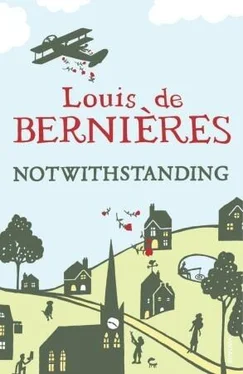Louis de Bernieres - Notwithstanding - Stories from an English Village
Здесь есть возможность читать онлайн «Louis de Bernieres - Notwithstanding - Stories from an English Village» весь текст электронной книги совершенно бесплатно (целиком полную версию без сокращений). В некоторых случаях можно слушать аудио, скачать через торрент в формате fb2 и присутствует краткое содержание. Год выпуска: 2010, Издательство: Vintage, Жанр: Современная проза, на английском языке. Описание произведения, (предисловие) а так же отзывы посетителей доступны на портале библиотеки ЛибКат.
- Название:Notwithstanding: Stories from an English Village
- Автор:
- Издательство:Vintage
- Жанр:
- Год:2010
- ISBN:нет данных
- Рейтинг книги:4 / 5. Голосов: 1
-
Избранное:Добавить в избранное
- Отзывы:
-
Ваша оценка:
- 80
- 1
- 2
- 3
- 4
- 5
Notwithstanding: Stories from an English Village: краткое содержание, описание и аннотация
Предлагаем к чтению аннотацию, описание, краткое содержание или предисловие (зависит от того, что написал сам автор книги «Notwithstanding: Stories from an English Village»). Если вы не нашли необходимую информацию о книге — напишите в комментариях, мы постараемся отыскать её.
is a funny and moving depiction of a charming vanished England.
Notwithstanding: Stories from an English Village — читать онлайн бесплатно полную книгу (весь текст) целиком
Ниже представлен текст книги, разбитый по страницам. Система сохранения места последней прочитанной страницы, позволяет с удобством читать онлайн бесплатно книгу «Notwithstanding: Stories from an English Village», без необходимости каждый раз заново искать на чём Вы остановились. Поставьте закладку, и сможете в любой момент перейти на страницу, на которой закончили чтение.
Интервал:
Закладка:
Spending the morning lying in the orchard, shooting down daffodils and thereby picking them in the manliest possible fashion, seemed the only way to pass the time without going mad. He was quite a good shot, but his Webley Junior was only a small-bore 177, and sometimes when he hit a stalk, the flower still didn’t topple. He decided that any hit counted as a plucked flower, otherwise he would never get enough of them in time for lunch. Sometimes he would aim at one flower, and another immediately behind it would topple over instead. The dog kept sabotaging his efforts by pouncing on him, snuffling in his face and wandering about in the line of fire. One of the cats, who enjoyed every spring sitting motionless and upright among the flowers, watched them both as if they were mad. ‘He thinks he’s a daffodil,’ Joan used to say. Next door, Miss Agatha Feakes, wearing her brown peaked cap and one of her vast home-knitted cardigans, threw seed to her chickens and milked the goats. A white-headed blackbird came down nearby. She’d known it for nearly ten years. She listened to the repeated pneumatic cough of the air rifle, and reflected that boys will be boys.
Joan made corned-beef fritters and baked beans for lunch, and afterwards Peter sought hopelessly for something to take up the slack until it was two o’clock and time to go out with the dog. There was only half an hour to wait, but it was, in emotional terms, a year. He emptied the waste-paper baskets, even though it wasn’t Thursday, and separated out the things that were not inflammable, small bottles and aerosols for female potions and lotions. They were often lilac-coloured. He had to watch out for his father’s discarded razor blades. The residue, which included the womenfolk’s balls of cotton wool with suspect deposits, and rough drafts of his own apostrophic poems to Froggy, Peter burned in the incinerator.
At a quarter past two Peter called the dog, who had been sighing pointedly ever since early morning. The dog sighed and waggled his eyebrows every day until he was walked, affecting an air of suffering, but as soon as anyone went to the walking-stick stand or fetched wellington boots, he would lift off vertically into the air, bouncing straight up and down so rapidly that it was impossible to attach his lead. You had to throw one arm around his neck and restrain him while his back half continued to cantilever up and down. In order to avoid unmanageable explosions of excitement, the family had had to learn to avoid mentioning the word ‘walk’ anywhere near the dog. Thus they progressed through ‘W-A-L-K’ to ‘promenade’, to ‘Spaziergang’ to ‘paseo’ to ‘peripateion’, with the dog always only one linguistic step behind.
Peter set off up the road past the big house where the famous actress lived with her charming but alcoholically outrageous bisexual husband, and past the council houses. In one of these houses lived John, gardener to the Shah of Iran, who had kept a motorcycle combination secretly from his wife all the years of their married life. He passed the hedging and ditching man, who was up to his waist in mud, brambles and nettles. He was cradling in his hand a cantankerous tortoise that he had found at the end of its hibernation in the bank side. Peter passed what was to become the Institute of Oceanography, unaccountably sited in the middle of the countryside rather than by the sea. Once a large workhouse, it was at this time Notwithstanding Homes. It housed a tribe of noisy and emotionally damaged children, who felt a natural and reciprocated disdain for the fortunate children of the village. Once Peter and Robert and Froggy’s brothers had got into a stone-throwing fight with some of them, which had ended with one of the Homes’ children receiving a large and ragged gash in the forehead. Peter, who had thrown the stone, had been aghast and guilt-stricken, and from then on all hostilities had ceased, both sides understanding at last the appalling consequences of war. The disadvantaged children retreated behind their twenty-foot wall.
Peter entered the woods and strode along a track that, after centuries of use, had sunk fifteen feet below the level of the forest floor. The banks on either side were thick with blueberries that, the moment they were ripe, fell victim to old ladies and squirrels. To the left was a stand of enormously tall Scots pine, where Polly Wantage, to the detriment of squirrels, ventured forth daily in brogues and plus fours, armed with her twelve-bore, and to the right lay the sandy hillside, brackened and bridle-pathed, which was known as Busses Common even though no one knew who Buss had been.
At the end of this track was a low white house whose owners had two Mercedes, were rumoured to possess an aeroplane, and were said to drive all the way to Harrods in order to buy butter. Peter turned right and followed the fence that separated the nuns of the convent from the outer world. Peter could not conceive why anyone would want to be a nun and renounce sex for ever. He had never had any himself, but he knew a priori that it would be as mad, self-defeating and bizarre as renouncing respiration or water.
There was a gentle slope to these tracks and paths, but at the summit of it, at Maclachlan’s bench, people realised that they had unwittingly gained a very great height. There was a sapling oak next to the bench, just right for a child’s first climb, and steep paths descended from it, down which it was customary to have vertiginous races, and where, in winter, the children, the dog and their mother careered together on toboggans, whooping with exhilaration, numb in face and finger, breathless with the exhaustion of dragging the sledges.
From the bench one could see across the ocean of trees to sombre Blackdown, where Tennyson and his friends had fled in order to avoid literary tourists on the Isle of Wight. In these parts Helen Allingham had painted her pictures of rose-draped cottages and the rural life thereabouts, to be condemned for ever by urban art snobs as a sentimentalist, even though those places were exactly as she depicted them, and often still are. The England that Peter saw, and Allingham before him, was the England that the English used to love, when England was still loved by the English.
Even though he had always lived there, this countryside that he surveyed from the crown of the hill still seemed to Peter an enchanted place, not because it was home, but because it had the archaic atmosphere of Arthurian romance. Because of the density of the trees one could see no dwellings in any direction for tens of miles, and when there was a mist in the low places, rising up off the fields and following the lines of the brooks, it took very little imagination to conceive of squired and mounted knights wending their way through the Hurst on quests. Down among the trees there was even a pink tower, of curiously suggestive appearance, where, had it not been a structure for the pumping of water, a fair demoiselle might have been imprisoned.
To the south among the breasted downs in the far distance rose Chanctonbury Hill, with its unmistakable ring of trees, tall and majestic, unreduced as yet by the great hurricane, where everyone said that the Sussex witches danced naked at Sabbaths. Folk would say that they wouldn’t go there, it was frightening, frightening and weird. North of the down, nothing could be seen at all because of the trees, but amid them lay the sagging cottages of agricultural workers, and the unpretentious houses of the rural middle classes, red-tiled in the Surrey farmhouse style from first floor to gutter. Disappearing beneath a forest of rhododendrons lay Sweetwater, a deserted dark tarn that had all but died of oblivion, where Peter had fished for years without ever seeing anything but moorhens and minnows. Once he had been caught poaching there, with Robert from Cherryhurst who was famous for catching the Girt Pike at the Glebe House.
Читать дальшеИнтервал:
Закладка:
Похожие книги на «Notwithstanding: Stories from an English Village»
Представляем Вашему вниманию похожие книги на «Notwithstanding: Stories from an English Village» списком для выбора. Мы отобрали схожую по названию и смыслу литературу в надежде предоставить читателям больше вариантов отыскать новые, интересные, ещё непрочитанные произведения.
Обсуждение, отзывы о книге «Notwithstanding: Stories from an English Village» и просто собственные мнения читателей. Оставьте ваши комментарии, напишите, что Вы думаете о произведении, его смысле или главных героях. Укажите что конкретно понравилось, а что нет, и почему Вы так считаете.












